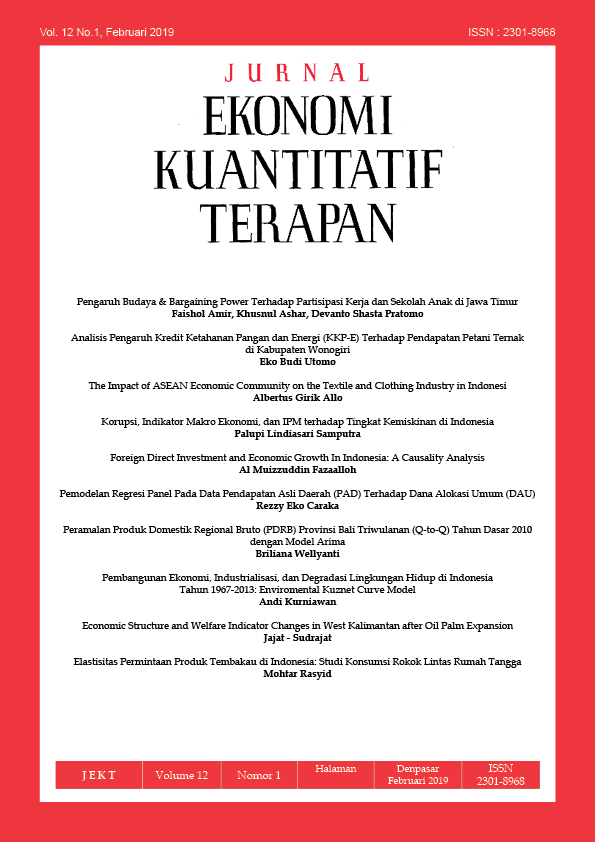Foreign Direct Investment and Economic Growth In Indonesia: A Causality Analysis
Abstract
This study analyse the causality relationship between foreign direct investment (FDI) and economic growth in Indonesia over the period 1970-2015. The method used in this research is Granger causality approach. Results from the estimation show that there is no causal relationship between FDI and economic growth in short and long run. However, the results in this paper indicate that there is a unidirectional causal relationship running from economic growth to FDI in short and long run. It means that economic growth influences FDI inflows in Indonesia.
Downloads
References
Agosin, M. R., & Machado, R. (2005). Foreign investment in developing countries: does it crowd in domestic investment?. Oxford Development Studies, 33(2), 149-162.
Azam, M., & Ahmed, A. M. (2015). Role of human capital and foreign direct investment in promoting economic growth: evidence from Commonwealth of Independent States. International Journal of Social Economics, 42(2), 98-111.
Balasubramanyam, V. N., Salisu, M., & Sapsford, D. (1996). Foreign direct investment and growth in EP and IS countries. The Economic Journal, 92-105.
Bermejo Carbonell, J., & Werner, R. A. (2018). Does foreign direct investment generate economic growth? A new empirical approach applied to Spain. Economic Geography, 1-32.
Borensztein, E., De Gregorio, J., & Lee, J. W. (1998). How does foreign direct investment affect economic growth?. Journal of International Economics, 45(1), 115-135.
Carkovic, M., and Levine, R. (2002). Does foreign direct investment accelerate economic growth?. Working Paper, Department of Business Finance, University of Minnesota, Twin Cities.
De Mello Jr, L. R. (1997). Foreign direct investment in developing countries and growth: A selective survey. The Journal of Development Studies, 34(1), 1-34.
Fadhil, M. A., & Almsafir, M. K. (2015). The role of FDI inflows in economic growth in Malaysia (time series: 1975-2010). Procedia economics and finance, 23, 1558-1566.
Ford, T. C., Rork, J. C., & Elmslie, B. T. (2007). Foreign direct investment, economic growth, and the human capital threshold: evidence from US states. Review of International Economics, 16(1), 96-113.
Gupta, P., & Singh, A. (2016). Causal nexus between foreign direct investment and economic growth: A study of BRICS nations using VECM and Granger causality test. Journal of Advances in Management Research, 13(2), 179-202.
Herzer, D. (2012). How does foreign direct investment really affect developing countries’ growth? Review of International Economics, 20(2), 396–414. http://doi.org/10.1111/j.1467-9396.2012.01029.x
Iamsiraroj, S. (2016). The foreign direct investment – economic growth nexus. International Review of Economics and Finance, 42, 116–133. http://doi.org/10.1016/j.iref.2015.10.044
Khaliq, A., & Noy, I. (2007). Foreign direct investment and economic growth: Empirical evidence from sectoral data in Indonesia. Retrieved from http://www.economics.hawaii.edu/research/workingpapers/WP_07-26.pdf
Levine, R., and Renelt, D. (1992). A sensitivity analysis of cross-country growth regressions. The American Economic Review, 942-963.
Li, X., and Liu, X. (2005). Foreign direct investment and economic growth: an increasingly endogenous relationship. World Development, 33(3), 393-407.
Lipsey, R. E., & Sjöholm, F. (2011). Foreign direct investment and growth in East Asia: Lessons for Indonesia. Bulletin of Indonesian Economic Studies, 47(1), 35-63.
Makiela, K., & Ouattara, B. (2018). Foreign direct investment and economic growth: Exploring the transmission channels. Economic Modelling, 72, 296-305.
Makki, S. S., & Somwaru, A. (2004). Impact of foreign direct investment and trade on economic growth: Evidence from developing countries. American Journal of Agricultural Economics, 86(3), 795-801.
Negara, S. D., & Adam, L. (2012). Foreign direct investment and firms' productivity level: lesson learned from Indonesia. ASEAN Economic Bulletin, 116-127.
Omri, Anis. and Kahouli, Bassem. (2014). The nexus among foreign investment, domestic capital and economic growth: Empirical evidence from the MENA region. Research in Economics, 68(3), 257-263.
Rehman, N. U. (2016). FDI and economic growth: empirical evidence from Pakistan. Journal of Economic and Administrative Sciences, 32(1), 63-76.
Saqib, N., Masnoon, M., and Rafique, N. (2013). Impact of Foreign Direct Investment on Economic Growth of Pakistan, Advances in Management and Applied Economics, 3(1), 35–45.
Sothan, S., (2017). Causality between foreign direct investment and economic growth for Cambodia. Cogent Economics & Finance, 5(1), p.1277860.
Srinivasan, P., Kalaivani, M., & Ibrahim, P. (2011). An empirical investigation of foreign direct investment and economic growth in SAARC nations. Journal of Asia Business Studies, 5(2), 232-248. http://doi.org/10.1108/15587891111152366
Temiz, D., & Gökmen, A. (2014). FDI inflow as an international business operation by MNCs and economic growth: An empirical study on Turkey. International Business Review, 23(1), 145-154. http://doi.org/10.1016/j.ibusrev.2013.03.003
Tiwari, A. K. and Mutascu, M. (2011). Economic Growth and FDI in Asia : A Panel-Data Approach. Economic Analysis and Policy, 41(2), 173–187. http://doi.org/10.1016/S0313-5926(11)50018-9
*** BKPM. (2016). Press Release Investment Realization in First Quarter of 2016 Rose 17.6%. Retrieved at: http://www.bkpm.go.id/id/publikasi-investasi/siaran-pers-investasi
***UNCTAD (2016). World Investment Report 2016. Retrieved at: http://unctad.org/en/pages/PublicationWebflyer.aspx?publicationid=1555




















